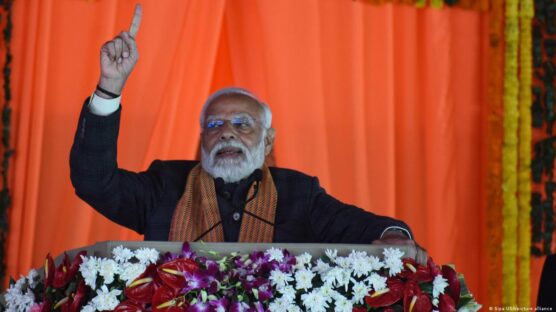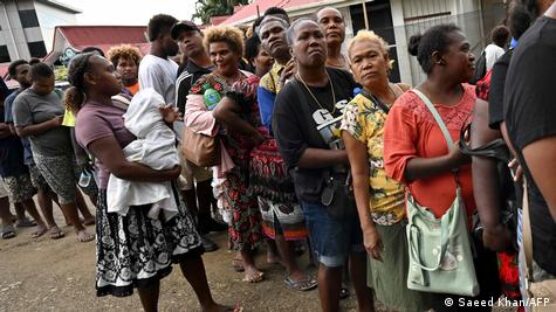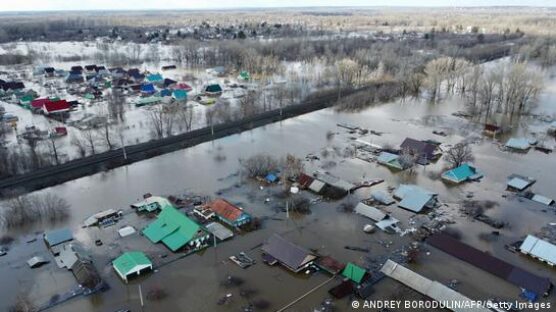German spy chief warns of Islamic State’s strength
By DW
17 July 2021 |
1:47 pm
The head of Germany's foreign intelligence agency has warned that the Islamic State is just as strong as it ever was — even without its caliphate. Terrorism experts agree that it has morphed into a powerful network.
In this article
Related
Related
1 day ago
More than a million people, including children, have fled their homes in the volatile Central Africa Republic to Cameroon. Not all have given up hope.
1 day ago
This Monday marks 12 months since war broke out in Sudan, caused by a power struggle between rival generals: on one hand, the army headed by General Abdel Fattah al-Burhan; on the other, the RSF paramilitary commanded by General Mohamed Hamdan Dagalo, also known as Hemedti.
1 day ago
As the Olympic flame begins its journey to Paris and the French capital prepares to host some 15 million tourists in less than four months' time, more than 80 NGOs are denouncing a form of "social cleansing". Authorities in the French capital has been relocating people from the streets in the city centre and around the Olympic sites. These vulnerable populations include homeless people, migrants and drug addicts.
6 hours ago
As elections near, India's nationalist BJP is trying to wrestle votes away from the opposition in Indian-administrated Kashmir. But standard campaign tactics might not be enough to win over Muslim voters in the region.
9 hours ago
Authorities in Germany's Bavaria say they want to restrict the use of cannabis at festivals and beer gardens. Germany legalized recreational marijuana earlier this month, a move opposed by the Bavaria-based CSU.
9 hours ago
Solomon Islanders began voting on Wednesday in a crucial election that will decide China's foothold in the Pacific region.
Polling booths opened at 7 a.m. local time on Wednesday (2000 GMT on Tuesday), with almost 420,000 registered voters to elect 50 members of the national parliament.
There are more than 1,000 polling stations scattered across the Solomons archipelago, 2,000 kilometers (1,200 miles) off Australia's coast.
Latest
10 mins ago
Chess master, Tunde Onakoya, has embarked on a mission to surpass the Guinness World Record for the longest chess marathon. The event, which is currently underway at New York City's iconic Times Square, started at 10am on Wednesday, April 17, and is scheduled to end at 8pm on April 19. Onakoya is set to engage in an intense chess marathon, aiming to play for 58 hours without a single defeat.
18 mins ago
Find these stories and much more when you grab a copy of The Guardian on Thursday.
6 hours ago
ing Abdullah II of Jordan defends his country's actions in shooting down Iranian missiles on Saturday, saying that Jordan's security comes above all else. Also, MPs in the UK back a new bill to ban smoking in the country, but Prime Minister Rishi Sunak faces rebellion from within the Conservative Party. Finally, Paris Saint-Germain mount a comeback to beat Barcelona and qualify for the Champions League semi-final, with one Spanish newspaper blaming the result on "suspect refereeing".
10 hours ago
Hundreds of thousands of people have been evacuated in Russia and Kazakhstan as the worst flooding in decades continues. In Orenburg, floodwaters rose higher than official expectations.
10 hours ago
Members of the United Nations Security Council failed to reach a consensus on a Palestinian bid for full UN membership.
10 hours ago
British actor Idris Elba on Tuesday joined the cast and crew of upcoming Sonic the Hedgehog spin-off series “Knuckles” at its world premiere in London.
×

Get the latest news delivered straight to your inbox every day of the week. Stay informed with the Guardian’s leading coverage of Nigerian and world news, business, technology and sports.


















0 Comments
We will review and take appropriate action.